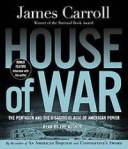 Has the rise of American power been disastrous? James Carroll asks this pointed question in House of War, a brilliant history of the Pentagon interwoven with a personal narrative. Carroll is an apt person to tell this story. The son of a general who became a priest, Carroll spent a fair amount of his childhood in that five-sided building, growing up only to try to exorcize the demons from it in that famous anti-war demonstration in 1967. This book not only captures a compelling personal story but details how the United States maintained its hegemony over a period of 60 years.
Has the rise of American power been disastrous? James Carroll asks this pointed question in House of War, a brilliant history of the Pentagon interwoven with a personal narrative. Carroll is an apt person to tell this story. The son of a general who became a priest, Carroll spent a fair amount of his childhood in that five-sided building, growing up only to try to exorcize the demons from it in that famous anti-war demonstration in 1967. This book not only captures a compelling personal story but details how the United States maintained its hegemony over a period of 60 years.
Carroll’s ability to use individuals’ personalities within the Pentagon establishment to raise questions about the ‘what ifs’ of history is the most powerful element of this book. Given that much of the story is centered on living in the nuclear age, the most captivating story in the book involves the debate over giving nuclear weapons to the Soviet Union. The main proponent of this was Henry Stimson and his nemesis, secretary of Naval forces, James Forrestal. This raises an interesting question: would giving the Soviet Union the secrets to the atomic bomb have co-opted them into the world system and ended the hostilities between the US and USSR? Carroll reveals a just paranoia on the Soviet side. Russia had just been invaded by Germany, a country with which it had a pact. Stalin himself was concerned with Western encroachment into his territory. Would following Stimson’s advice have meant an end to this tension? A closer look at history reveals that the Soviet Union was actively seeking to accommodate the United States. It undermined the independence movement in Greece, arresting members of the EAM (the Greek Guerilla movement) when it sent a delegation to Moscow. Moreover, the Soviets also offered to get out of East Germany on the condition that the country could have internationally supervised elections and would not be a member of NATO. Nonetheless, I’m not sure, given the tone and determination of Paul Nitze’s famous NSC-68, that the United States would have abandoned its messianic vision toward global hegemony which would have ultimately pushed a nuclear armed Soviet Union into some form of confrontation. In essence, the problem United States policymakers had wasn’t solely with a well armed Soviet Union but with the Soviet Union as a representation of a competing global power.
Indeed, the Cold War was not the Manichean world that our leaders had us believing. It was filled with infinite shades of grey and almost always involved poor Third World countries being caught in the cross fire. Carroll’s account of the Vietnam War is an example of the author demonstrating his finest work. By tracking his moral quandary over his father’s involvement in the military, him loving the Pentagon as a child, to being swooned into finally protesting it by the Jesuit priest, Father Phil Barrigan, Carroll demonstrates a remarkable ability to be analytical, passionate, and searching at the same time. Carroll’s description of the Vietnam War as a battle of technology against poor peasants aiming only for their own independence is told with the passion and compassion of a man deeply concerned with the fate of humanity.
Skipping to the section covering the end of the Cold War, Carroll is most cogent. His description of the actions of NATO in Kosovo and how the American government ignored the peace movement in the former Yugoslavia is telling. It can be seen as a foreshadowing of what was to come years later in the confrontation with Iraq: a power bent on doing whatever it wanted in the world without asking permission from anyone. Carroll rightfully identifies this and eloquently calls on the reader to stop this madness. House of War makes for an informative and provocative read on the dark side of American foreign policy. Indeed, it is a powerful anti-war epic that should be an instant classic.